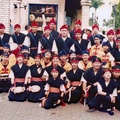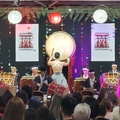When the subject is society, we automatically talk about history. Human relationships are analyzed and discussed by scholars from Antiquity to current times. British sociologist Stuart Hall, for example, reminds us that “nations are always made up of different social classes and different ethnic and gender groups”.
Brazil would be no different. In fact, the country is marked by multiculturalism, a result of the former slave society and immigration policies, mainly in relation to the arrival of Japanese people. As a result of hard work, the Japanese managed to prosper and provide their children with education. Thus, Brazilian Nikkei gained prominence in traditional undergraduate courses and, therefore, in their respective areas of activity.
Values such as discipline, dedication to education and work, and cooperativeness were passed on to subsequent generations. They have become “obligatory” characteristics in the Japanese-Brazilian personality.
Memory [...] is not a property of intelligence, but the basis, whatever it may be, on which the concatenations of acts are inscribed. In this sense, we can speak of [...] an "ethnic" memory that ensures the reproduction of behaviors in human societies [...].¹
Are all people of Japanese descent the same?
When we reflect, we will realize that the answer is no. This thought applies to other ancestries and different nationalities. But it is natural for Nikkei to have common characteristics and behaviors. The problem is thinking that there is some kind of standard and falling into the stereotype trap. Translating: cliché; commonplace (formula, argument or idea already well known and repeated; trivial thing), according to the Aurélio Portuguese Language Dictionary .
Because each person, although similar to other people in the same group, creates their own identity based on unique experiences.
School life: discoveries
I attended a neighborhood school, of German origin, throughout the period from Kindergarten to High School and, thus, learned German. I discovered ease and enjoyment in studying the language, as well as an interest in learning about the local culture. I was called a nerd because I was among the best students. It was not uncommon for people to find it strange that a Japanese woman knew a Germanic language and had difficulty in subjects that were supposedly mastered by Easterners.
In the last year of high school, I took the pre-university course in the Exact Sciences class to reinforce Mathematics and Physics (in Chemistry I got good grades, perhaps because I was curious).
Conflict in choosing a professional career
I even thought about studying Medicine, Law, Environmental Engineering… But I gave up. I love writing. I'm not one for numbers, calculations and the like. Despite everything, my parents wanted me to follow in their footsteps in the IT (Information Technology) field. I had a lot of doubts, but I was sure that I wouldn't want to work with that.
My two sisters also went through the same situation and, like me, they sought professional (and personal) fulfillment in other activities. Logically, very different from systems analysis and programming.
(Late) interest in Japanese culture and language
I confess that I had no interest in the culture of my ancestors and it only emerged when, in fact, I joined the Japanese-Brazilian community. I wanted to learn Japanese on my own, but I soon became discouraged, because older people recommended taking a language course.
It took a while – a few years – for the idea to mature. Until I got tired of wasting time and finally signed up. I studied for two years. In my class, I was the only Nikkei who hadn't learned Japanese as a child. Because of this background, most of the time, my colleagues absorbed the content of the classes faster than me.
Typical family customs
It's funny that since I was a child and to this day I still get a little confused with chopsticks . Before, I felt uncomfortable with this, because others were willing to try to teach me and said it was easy. In my late 20s, I decided that I preferred eating utensils. Many times when I went to an oriental self-service restaurant, I was practically the only person (among descendants and non-descendants) who used a fork and not Japanese chopsticks.
There was a phase when my younger sister started using only chopsticks – both for eating and cooking. Then the rest of the family joined. During this period I got used to it out of habit, because, in truth, it is just a matter of practice.
A custom that my family had, probably because of more frequent contact with my grandparents on my father's side, was to speak words and expressions in Japanese. When you wake up, ohayou ; before eating, itadakimasu ; oishii for savory; after eating, gochisousama ; hirune to doze; when sleeping, oyasumi ; urusai for irritating; kusai for stinky; onegai to ask a favor; omedetou for congratulations.
In the end, where will we arrive?
After theorizing, arguing and exemplifying, my conclusion is that our identity changes. Not only according to the historical moment but also according to the moment in which the person lives. Therefore, the challenge remains to resolve unknowns that surround human beings with the aim of better understanding them, both in their individuality and in their social relationships.
note:
1. Le Goff, Jacques. History and Memory . Campinas: SP Editora da UNICAMP, 1990.
References:
HALL, Stuart. Cultural Identity in Post-Modernity. 11. ed. Rio de Janeiro: DP&A, 2006.
© 2019 Tatiana Maebuchi






